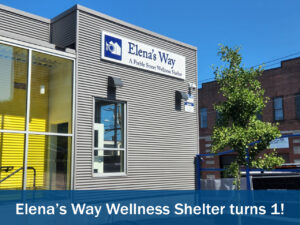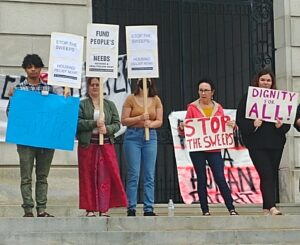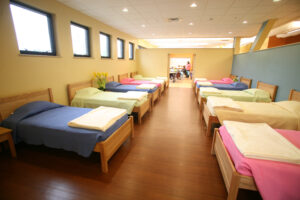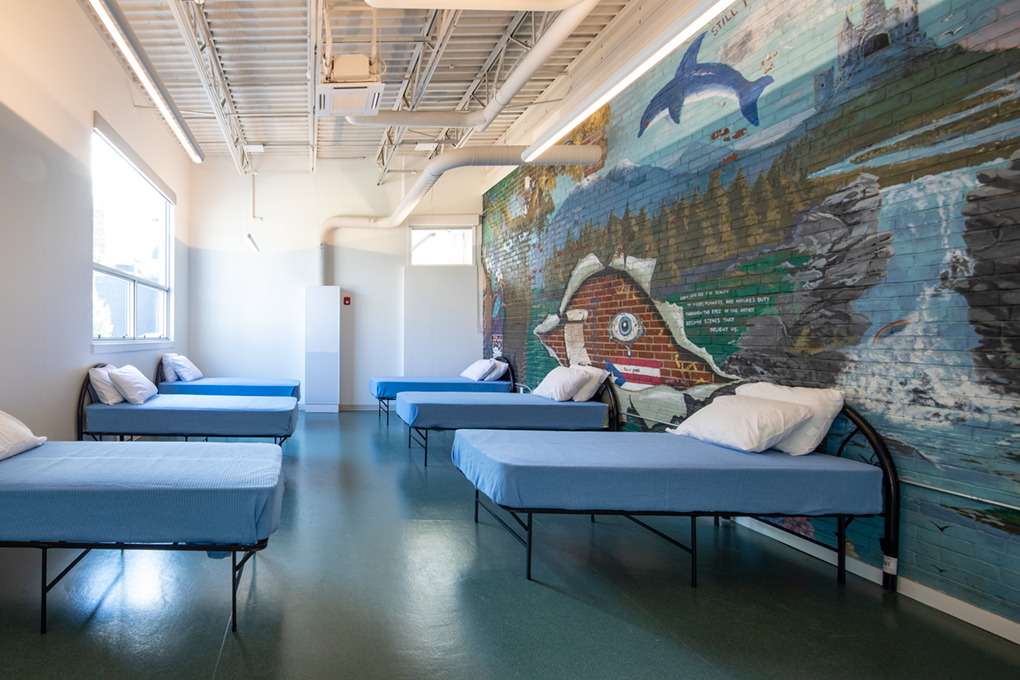Hundreds of Mainers are living outside in the elements in our parks, alongside our highways, and on our streets. With shelters across the state at capacity every night, each tent you see is a visual representation of the critical need for shelter beds in communities all across our state. It is inhumane for people to live outside, especially with the cold of winter upon us, and we must commit to finding solutions to the unsheltered homelessness crisis.
Emergency shelters play a critical role in solving unsheltered homelessness and in keeping communities safe. Shelters stayed open throughout the pandemic, and, in many cases, expanded areas of work and services to keep communities safe, while meeting the complex needs of individuals and families who need help. But, emergency shelters in Maine are operating with budget deficits as high as 70% and struggle each year to keep their doors open.
High-quality professionally run shelters provide more than just a place to sleep for a night. They provide staff who are trained in trauma-informed care and harm reduction, housing navigation services, case management, healthy and nutritious meals, and more. Shelters also divert the most vulnerable from relying on the most expensive services like hospital emergency rooms, jails, police, emergency response systems, and the child welfare system.
Low-Barrier Shelter Funding Testimony by Mark Swann to Joint Select Committee on Housing
“Moving into the shelter has changed my life,” shares a client staying at the Elena’s Way Wellness Shelter, a low-barrier shelter focused on individuals who struggle with complicated mental health and substance use disorders and struggle in higher barrier shelter environments. “I love my case manager. I am connected with medical care now and I am 10 days sober. My caseworker came to see me at detox and had me sign paperwork. I am working towards my goals. I want to get off the streets.” If Elena’s Way, or any other shelter in Maine, closed its doors, the impact on the community would be devastating.
Governor Mills and the Maine legislature provided critical support last session for the most vulnerable Mainers by supporting one-time emergency shelter funding, funding for affordable housing, and Site-based Housing First. But, there is still more to be done.
Providing funding for Maine’s emergency shelters, especially low-barrier shelters, will help with our current unsheltered crisis and allow our existing emergency shelters to keep their doors open. It will create additional capacity and give more people access to shelter and allow for more staff to provide critical case management and faster housing placements.
Annual Budget Deficits for Maine Emergency Shelters
| Bangor Area Shelter | 65-70% |
| HOME (Ellsworth) | 56% |
| Mid-Maine Homeless Shelter (Waterville) | 70% |
| Preble Street | 60% |
| York County Shelter | 65% |
Low-barrier shelters are often a primary entry point for unsheltered community members who have little to no access to social, behavioral, and medical service providers. The few low-barrier shelters in Maine are currently at capacity, severely limiting access. In addition, low-barrier shelters are further hampered by inadequate state revenue streams, causing deficits and creating imminent possibilities of shelter closures. Low-barrier shelters aim to ensure that individuals who may be actively using drugs, among others, can access a safe and consistent shelter environment.
Significant and ongoing funding is needed to support low-barrier, professional shelters. The Maine legislature will consider legislation in January to support homeless shelters in Maine and the vital services they provide for vulnerable people.
TAKE ACTION!
Click the links below to contact the Governor’s office and Maine policymakers and tell them to support increased and ongoing funding for emergency shelters in Maine.
Read more

One year of changing lives at Elena’s Way
“I have chronic PTSD and could not handle the environments at other shelters. This shelter is different. I was living in a tent that collapsed from snow. They helped me come inside. Now I have an apartment coming.” — Elena’s Way client Since opening its doors one year ago, the Elena’s Way Wellness Shelter has provided 9,054 bed

Tell the City Council to lower barriers to shelter and STOP THE SWEEPS!
The Portland City Council is taking public comment about encampment sweeps at their meeting this Tuesday, September 26, at 5pm. Please attend and make your voices heard, OR email them before September 25 at 12pm to ensure your comments are included in their packets! Last week, Preble Street shared our recommendations for action steps on how to solve

It’s time to invest in more shelter beds
The people who have been living at the Bayside Trail encampment deserve dignity and safety. No one should have to sleep outside in Maine or in unsafe or unhealthy conditions. Everyone should have access to toilets and safe drinking water and a roof over their heads. Preble Street will continue to work with the City

